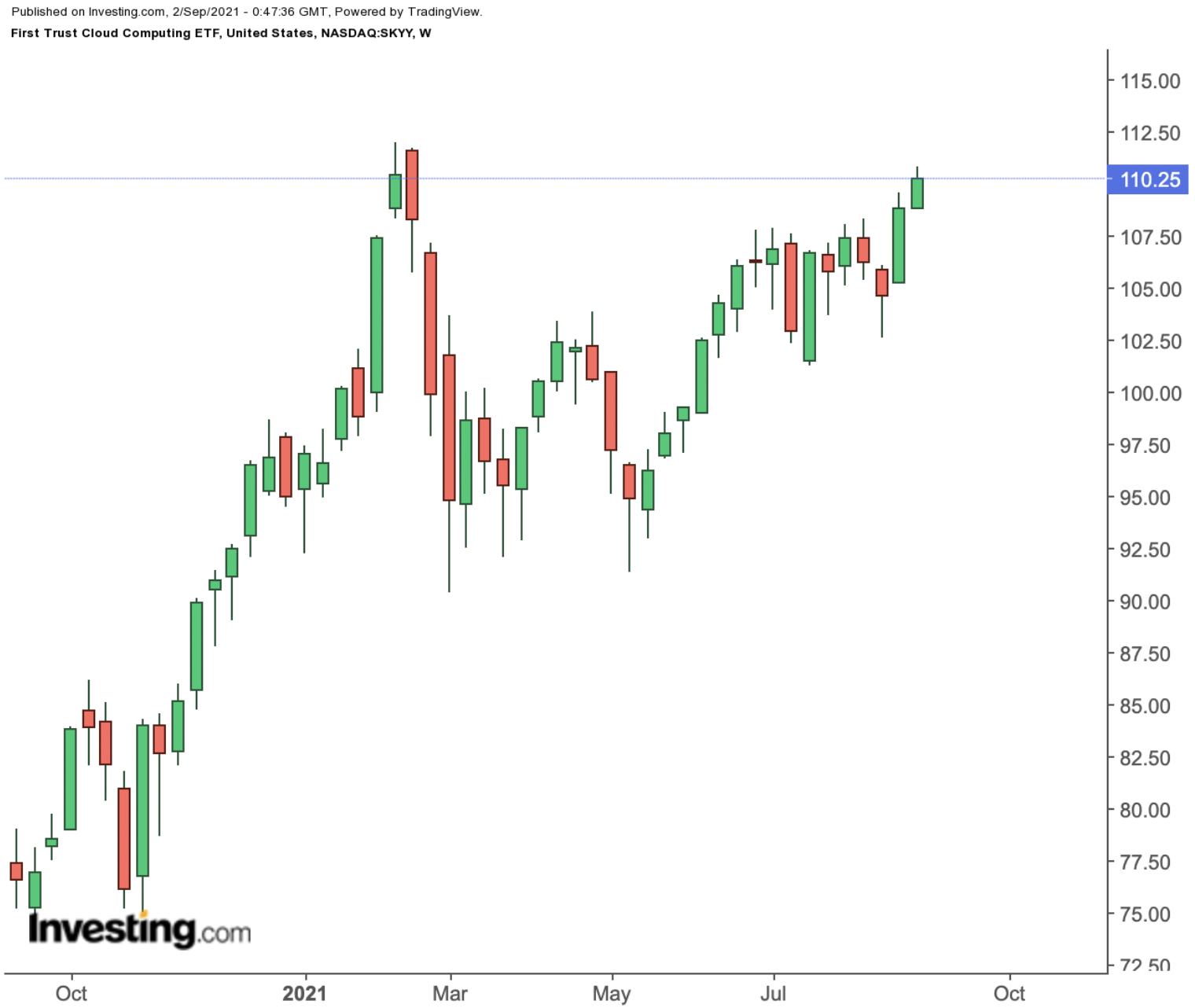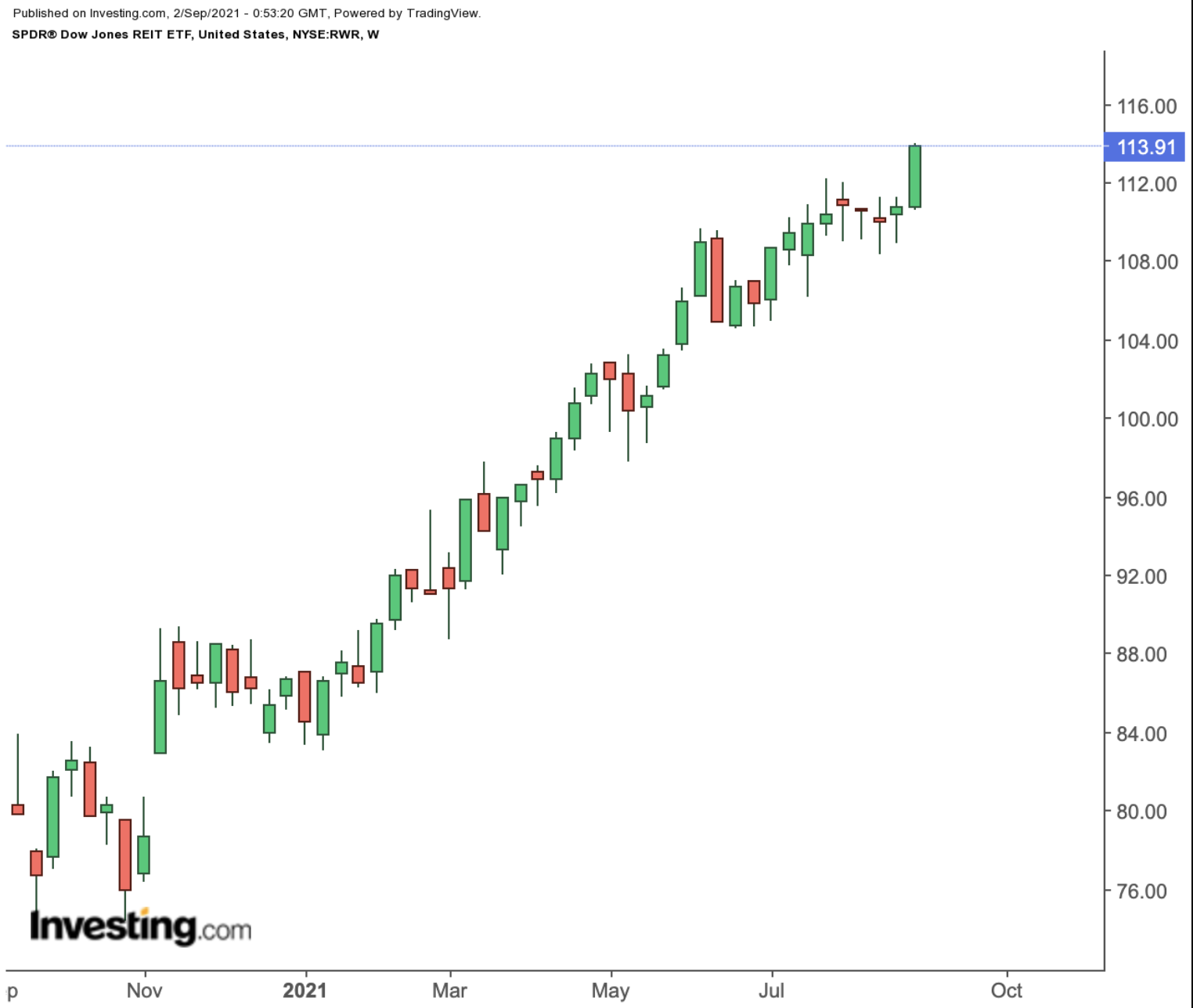Broader markets, as well as many stocks, are hovering near record highs. So far in 2021, the Dow Jones Industrial Average, the S&P 500 and the NASDAQ 100 are up about 15.5%, 20.4% and 20.9%, respectively.
After months of solid gains, analysts now debate whether some of the darlings of Wall Street could be ready to take a breather. Therefore, today we discuss two exchange-traded funds (ETFs) that might come under pressure due to short-term profit-taking. These declines could offer investors better entry points into funds that could find a home in long-term portfolios.
1. First Trust Cloud Computing ETF
Current Price: $110.25
52-Week Range: $74.34 - $114.07
Dividend Yield: 0.17%
Expense Ratio: 0.6% per year
The First Trust Cloud Computing ETF (NASDAQ:SKYY) invests in businesses that derive part of their revenues from cloud computing-related activities.
Microsoft defines cloud computing as “the delivery of computing services—including servers, storage, databases, networking, software, analytics and intelligence—over the Internet ('the cloud') to offer faster innovation, flexible resources and economies of scale. Typically, you only pay for cloud services you use.”
Recent metrics highlight:
“The global cloud-computing market size is projected to reach US$791.48 billion by 2028, exhibiting a CAGR of 17.9%.”
Therefore, we can expect Wall Street to pay increasing attention to the sector.

SKYY, which has 65 holdings, tracks the returns of the ISE Cloud Computing™ Index. The fund started trading in July 2011.
In terms of the sub-sectoral breakdown, the software sector comprises the biggest portion, with 55.13%; followed by the IT services (18.92%); technology hardware, storage and peripherals (6.76%); and internet and direct marketing retail (6.10%). The top 10 stocks account for about a third of net assets of $6.43 billion.
Leading names in the roster include tech giants Alphabet (NASDAQ:GOOGL) (NASDAQ:GOOG), Microsoft (NASDAQ:MSFT) and Amazon (NASDAQ:AMZN); enterprise software group Oracle (NYSE:ORCL), database platform MongoDB (NASDAQ:MDB) and cloud-based networking solutions provider Arista Networks (NYSE:ANET).
Over the past year, the fund is up about 31%, and returned more than 15% year-to-date. In February, SKYY saw a record high of $112.02, a level that could act as resistance in the coming days. In such a case, a decline toward $105 or below would be likely. Potential investors could regard a potential dip as an opportunity to put some capital into the sector.
Wall Street loves recurring-income business models, which most cloud companies have built. As a result, these names have high margins as well as free cash flow and potentially robust long-term growth prospects.
2. SPDR Dow Jones REIT RWR ETF
Current Price: $113.91
52-Week Range: $74.34 – $112.43
Dividend Yield: 3.05%
Expense Ratio: 0.25% per year
The SPDR® Dow Jones REIT ETF (NYSE:RWR) gives exposure to publicly traded real estate investment trusts (REITs) in the US. Since the fund’s inception in April 2001, net assets have reached $1.91 billion.

RWR, which has 114 holdings, tracks the investment results of the Dow Jones Select REIT index. In terms of sectors, we see information industrial/office REITs (31.67%) followed by residential (22.47%), retail (14.85%) and health care (10.40%).
This composition makes it a broad-based fund. However, it typically excludes mortgage REITs and specialty REITs (like outdoor advertising, cell towers or correctional facilities).
Leading stocks include Prologis (NYSE:PLD) that invests in logistics facilities worldwide; Public Storage (NYSE:PSA), which operates self-storage facilities; Digital Realty Trust (NYSE:DLR), which owns data centers; Simon Property Group (NYSE:SPG), which operates shopping malls and outlet centers; and Welltower (NYSE:WELL), which focuses on health care real estate, like seniors housing and outpatient medical service providers. The top 10 names comprise about 40% of the fund.
RWR returned more than 38% in the past 52 weeks and 29.5% in 2021. The ETF saw a record high in recent days. Readers who believe the fund might soon come under short-term pressure could find better value between $100 - $105.
